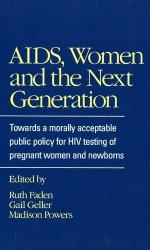|
This section contains 2,546 words (approx. 9 pages at 300 words per page) |

|
Hiv Testing in Newborns
Summary: Presents an ethical analysis of the mandatory newborn HIV testing law enacted in New York State. Describes what efforts are being made to prevent it and the ethics of the situation.
This paper presents an ethical analysis of the mandatory newborn HIV testing law enacted in New York State. The law was passed as an effort to decrease maternal transmission of HIV, by treating infants born to HIV positive mothers immediately after birth with AZT. Newborn testing was promoted by the legislative and medical community following the overwhelmingly positive response from HIV infected pregnant women who were given AZT in the ACTG 076 clinical trials. Pregnant mothers who were given AZT had a markedly lower transmission rate than mothers who had not received it. This paper examines this newborn testing policy from a Utilitarian perspective to ascertain if the goals of the policy are feasible. The potential advantages, as well as the failures of using this policy are discussed. Implementations to improve the policy are also presented.
Ethical Dimensions of Mandatory HIV Testing of Newborns
in New York State: A...
|
This section contains 2,546 words (approx. 9 pages at 300 words per page) |

|


